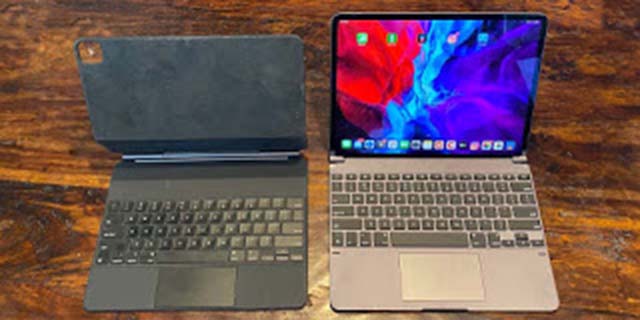Apple’s Magic Keyboard for iPad Pro and Brydge Pro+
 |
| Apple’s Magic Keyboard. Image Credit: Jeremy Horwitz/VentureBeat |
Above.
Apple’s Magic Keyboard for iPad Pro (left) and Brydge Pro+ (right).
I've spent a significant part of the previous month
considering the connection between force, accommodation, and client experience
due to a few items I've tried for telecommute purposes. What sent me to the
brink to expound on it was another iPad Pro console trackpad mix called
Brydge Pro+, the main such accomplice to be declared for Apple's tablet,
however the third to arrive at normal buyers. There's no compelling reason to
completely audit Pro+, however it merits considering why it comes up short
contrasted and its opponents.
On one hand, Pro+ is the most attractive,
best-feeling iPad console trackpad out there, and sensibly valued for what it
should convey. Produced using aluminum, it feels more like something Apple
would make than the plasticky iPad Pro Magic Keyboard Apple really discharged.
It utilizes remote Bluetooth to interface with the iPad, and has its own
battery, so its illuminated console (with a full column of helpful easy route
keys!) and pleasantly estimated following surface don't disintegrate the
tablet's own capacity source when you use them.
In any case, in true use, Pro+ ends up being the
least advantageous alternative, and that issues a great deal. Something in the
firmware or Bluetooth association has driven the following to feel less smooth
in Brydge's execution than contending consoles from Apple and Logitech. Despite
the fact that it's quantifiable in milliseconds instead of seconds, there's a
trace of slack, and it doesn't bolster all the multi-contact motions (counting
fast application exchanging) that you can use with the Magic Keyboard. This
really impacts profitability, and Brydge knows so a lot: It says it's despite
everything dealing with Pro's firmware to improve execution, and cases "it
won't stop" until the experience satisfies hopes.
The way that Pro+ happens to be generously more
affordable than Apple's own choice isn't lost on me; there's a $100 contrast
between Brydge's metal structure and Apple's for the most part plastic one. In
any case, if Apple's prosperity in the course of recent decades has shown
anything, it's that a few people — numerous individuals, even — will pay a
premium for something that is simpler to utilize as well as progressively
advantageous, in spite of different issues it might have.
As we work to recuperate from the pandemic,
different organizations searching for progress with the present compensation
and time-compelled customers probably won't have the option to depend on
Apple-level additional benefits. However, they ought to follow this exercise:
Convenience matters to innovation clients, maybe now like never before, and
concentrating on making your items simpler to utilize will give you the edge
you have to prevail upon your next influx of clients.
For telecommute, innovation's accommodation matters
more than its capacity
Throughout the years I've filled in as an innovation
columnist, I've been fortunate enough to watch various item classifications
advance from their most punctual days to development and some of the time
sunsetting — a repeating procedure that is once in a while indistinguishable
between various sorts of items, yet regularly has similitudes from
classification to class. One repeating theme I've seen is that sooner or later,
various items inside a classification will in general become comparative (or
acceptable) enough in drive that those distinctions matter not exactly a basic
comfort one proposals over the others, so the "victor" isn't the most
grounded or most different other option, yet rather the one with the best
client experience.
Regardless, the coronavirus pandemic unexpectedly
pushed a significant part of the work power into the virus water tank of
telecommuting, and numerous organizations are flagging that this change will
proceed for a considerable length of time after open spaces revive.
Organizations, for example, Apple have detailed striking upticks in their deals
of customary and tablet PCs for use in home workplaces, yet paying little heed
to the stage or gadgets you or your manager like, the spotlight today ought to
be on comfort and client experience, not simply crude torque.
Past the need to produce customary work item —
ideas, records, articles, or administrations — present day telecommute
situations currently power guardians to get liable for their children's
training and additionally childcare, stressing even the most profession
concentrated person's capacity to concentrate on their tasks. It's in that
setting that accommodation has developed as a possibly conclusive bit of leeway
for organizations that sell items: Saving valuable snapshots of a client's time
isn't only a "real existence hack," yet rather the best way to
shuffle various covering duties.
A few organizations have made fortunes profiting by
accommodation. In decades past, Polaroid promoted moment however average
photographs that didn't require a visit to a photograph preparing lab, which
implied they could be appreciated quicker yet would blur more rapidly than
rivals. Ronco likewise made a billion-dollar business by concentrating
unequivocally on the straightforwardness of its "set it and overlook
it" ledge rotisserie stove. Amazing showcasing master Ron Popeil knew
there was enchantment in placing an entire chicken or section of meat into a
gadget and returning later to locate a prepared to-serve supper for four, and
his organization assembled the item exclusively to convey that definite
experience.
For different reasons, innovation organizations
concentrated for a considerable length of time on specs and execution as
opposed to accommodation and client experience, yet Apple's developing
victories toward the beginning of the 2000s started to change the conversation.
The organization's CEO showcased different new innovation advancements with a
mantra — "it just works" — that vowed to liberate clients from being
buried in the points of interest. Apple engineers had just sanded off the
unpleasant edges, he proposed, so you could simply appreciate the advantages
without considering them.
